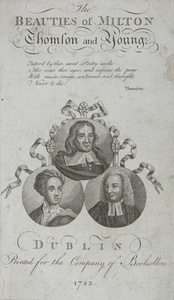| Method | Copper engraving and stipple |
| Artist | |
| Published | Dublin, Printed for the Company of Booksellers, 1783. |
| Dimensions | Sheet 165 x 95 mm |
| Notes |
Inscription reads: 'Tutor'd by thee, sweet Poetry exalts / Her voice thro' ages; and informs the page / With music, image, sentiment, and thought, / Never to die! / Thomson.' Frontispiece of The Beauties of Milton, Thomson, and Young. The portraits of the three poets are enclosed in roundels and decorated with medals and ribbons. John Milton (9th December 1608 – 8th November 1674) was an English poet, theologian, and civil servant during the Cromwellian Protectorate. Milton is regarded as one of the greatest English poets, often elevated to the equal of Shakespeare, and a master of political pamphleteering. Forceful and idealistic, he served the Commonwealth as Latin Secretary but was arrested upon the restoration of Charles II. The tragic circumstances of his life - an unhappy marriage, the premature death of his second wife and his eventual blindness in 1652 - are reflected in the often despairing tone of his work. Milton is best known for his epics, Paradise Lost (1667), Paradise Regain'd and Samson Agonistes (1671). Although Milton achieved widespread recognition during his own lifetime, being hailed as a master of the epic style, his legacy grew exponentially after his death. His style, fiercely defended by the poet in the prologue to Paradise Lost, was a reaction to rhyming verse, which was the popular fashion of his time. Describing rhyming verse as 'vulgar' and 'Germanic,' Milton aimed to return poetry to the purity of form found in the classical poets. This attitude had a profound effect on other English poets, including Dryden and Alexander Pope. Perhaps the most important legacy of Milton's poetry was its affect on the literature of the Romantic movement. Milton's characterisation of Satan in Paradise Lost heralded the birth of the Romantic anti-hero, a figure that would loom large in the works of the British Romantics. In Mary Shelley's iconic Frankenstein, it is Milton's Satan that the Creature sees as the most appropriate reflection of himself, a figure driven to terrible deeds, but worthy of pathos, tormented by the condemnation of an unfeeling creator. The tragic Byronic hero likewise draws much of its inspiration from Milton's treatment of Satan, and the intense emotion of Milton's text was an inspiration to artists and poets from William Blake to William Wordsworth. O'Donoghue 5, Alexander 21 Condition: Water stain to right of title, not affecting image, surface dirt and creasing to sheet. |
| Framing | unmounted |
| Price | £15.00 |
| Stock ID | 36387 |

